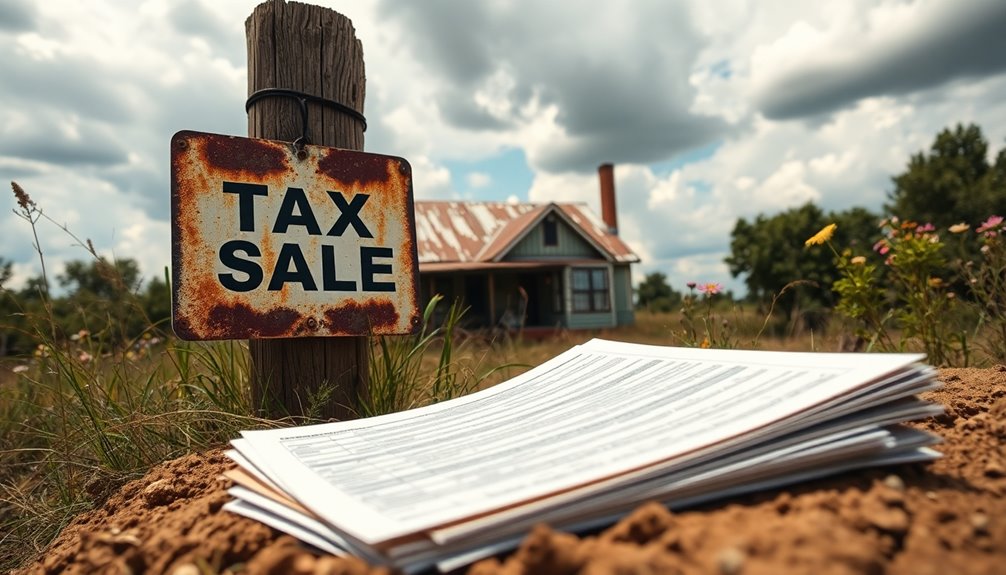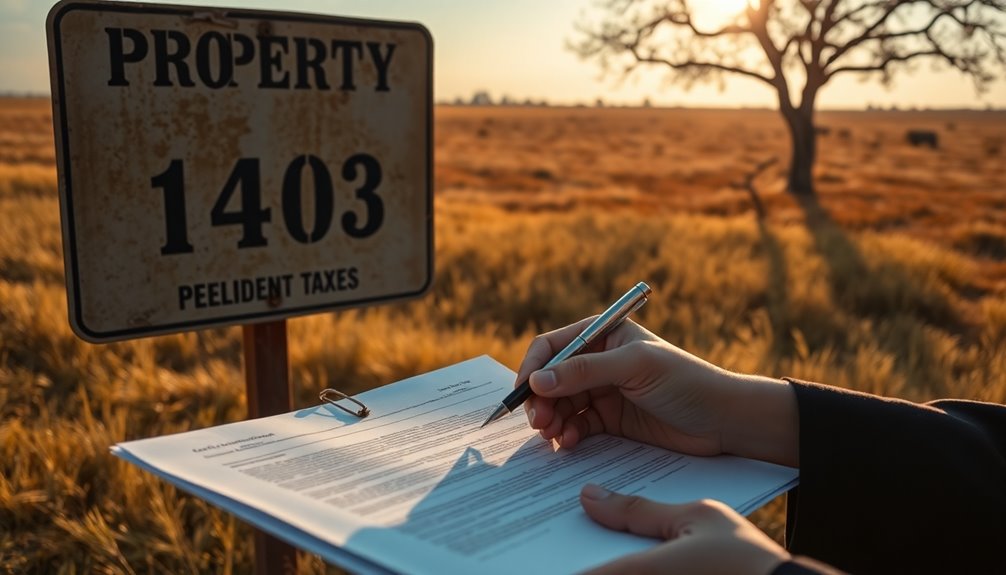To buy property with delinquent taxes in Texas, start by finding listings through local county appraisal district websites. Next, understand the foreclosure process, which includes potential penalties for unpaid taxes. Attend tax lien and deed auctions, often held on the first Tuesday of each month, and make sure to register in advance. Research thoroughly to understand liens and property values, and set a budget to avoid overspending. After winning, ensure you handle any additional costs and legal checks. The path to owning these properties can be complex, so keep going to get all the essential details.
Key Takeaways
- Research local county websites for delinquent property listings and tax sales to identify potential purchases.
- Register for tax lien or deed auctions, preparing necessary funds for immediate post-auction payment.
- Conduct thorough due diligence, including title searches, to uncover existing liens and property conditions.
- Understand the redemption period and penalties associated with delinquent taxes to assess financial risks.
- Consult with real estate professionals or legal advisors to navigate the complexities of tax sales effectively.
Locating Tax-Delinquent Properties

Locating tax-delinquent properties in Texas can be straightforward if you know where to look. Start by visiting the official websites of your local county or appraisal district. For instance, the Harris County Appraisal District offers a handy delinquent tax roll search tool, while the Dallas Central Appraisal District provides an updated list of properties with unpaid taxes.
Bexar Appraisal District even has a dedicated page for tax-delinquent properties, often featuring downloadable files for easier data analysis. Texas has seen significant growth in property values, making these delinquent properties potentially lucrative investments.
You can also tap into public records, as counties regularly publish tax delinquent property lists. These lists contain detailed information about properties with outstanding taxes and can be downloaded for potential investment opportunities.
Don't overlook local tax collection offices, either. They can provide crucial information about properties with delinquent taxes and details on upcoming tax sales. You may need to fill out specific forms and possibly submit notarized requests, so be prepared for that.
Finally, check notices for sheriff's sales, usually held on the first Tuesday of the month in some counties. These auctions are often listed on county websites and can be a great opportunity to purchase tax-delinquent properties.
Understanding the Foreclosure Process

Understanding the foreclosure process for tax-delinquent properties in Texas is essential for potential buyers and homeowners alike. When property taxes aren't paid by January 31, a tax lien is placed on the property, marking the start of delinquency on February 1. Failing to pay incurs escalating penalties, reaching a staggering 41.6% by July 1. A tax lien typically remains until the property taxes are paid in full, which can significantly impact potential buyers.
Foreclosure proceedings can begin anytime after this deadline, depending on the county's policies. If you haven't made a good faith effort to pay, the county may initiate a lawsuit to notify you of the foreclosure. Even after being served, you still have options to halt the process, but timely action is crucial.
Before a foreclosure sale takes place, you'll receive a 21-day notice. These sales typically occur on the first Tuesday of each month, often at the county courthouse, where the property is sold to the highest bidder.
Understanding these steps can help you navigate the complexities of tax-delinquent properties and may even lead to opportunities for purchasing properties at auction. Stay aware of your rights and options to manage or avoid foreclosure effectively.
Attending Tax Lien Auctions

When you're ready to buy property at a tax lien auction, it's crucial to be well-prepared. Start by registering for the auction, which often requires a refundable deposit. Each county has its own registration process, so make sure you meet any deadlines and are aware of any associated fees.
Next, dive into research and due diligence. Check the county tax assessor's website for the auction schedule and available properties, along with their lien amounts. Investigate each property's condition, market value, and any existing liens. A title search can uncover additional debts that could affect your investment. Keep in mind that local governments impose tax liens on properties for unpaid taxes, which is essential to understand as you research.
Budgeting is key. Establish a clear budget and stick to it to avoid overbidding. Ensure you have liquid funds ready to pay the bid amount immediately after the sale, often requiring certified funds like a cashier's check. Remember to factor in all costs, including delinquent taxes and fees.
Finally, consider attending an auction as an observer first. This helps you understand the bidding dynamics and refine your strategy. Networking with other investors can also provide valuable insights, making you better prepared for your auction experience.
Participating in Tax Deed Auctions

Participating in tax deed auctions can be an exciting opportunity for investors looking to acquire properties at a fraction of their market value. To get started, you need to register with the auction platform, like RealAuction for Travis County.
Don't forget to submit your Bidder Registration to the tax office, which includes a $10 fee and valid ID. Your registration is valid for one year, but make sure you aren't delinquent on any taxes in the county.
About 15 days before the auction, check the list of available properties on the county tax office or auction website. Use the Bidder's Basic Guide to research your options, looking for any other liens that might affect the property. It's also important to note that foreclosure auctions occur on the first Tuesday of each month.
On auction day, remember that the starting price includes all delinquent taxes, interest, penalties, and legal costs. The highest bidder wins, and payment is usually due immediately, requiring certified funds.
Auctions happen on the first Tuesday of each month, either in person or online. After the sale, the county will mail you a Constable's Deed within four weeks, officially transferring the property rights to you.
Post-Auction Procedures

After winning a property at auction, you'll need to navigate several important post-auction procedures to secure your investment. First, payment must be made immediately or within a few days, typically in cash or by certified check. Remember, the winning bid amount includes delinquent taxes, penalties, and auction costs. Failing to pay could lead to forfeiting your bid, so be sure to follow the county's specific regulations for payment.
Next, be aware of the redemption period, which generally lasts between 180 days to 24 months. During this time, the original owner can reclaim the property by paying what they owe, plus penalties and interest that can soar as high as 25% to 50%. If the property isn't redeemed, you'll gain full ownership. Additionally, this redemption period creates uncertainty for bidders, as it affects the overall investment strategy.
Once you complete the payment, the county will transfer the deed to your name, solidifying your legal ownership. You can then use, sell, or develop the property as you wish.
However, keep in mind that if the previous owner refuses to vacate, you may need to file an eviction case. Always ensure you're compliant with local and state laws regarding property ownership.
Risks of Buying Delinquent Properties

Buying delinquent properties can come with significant risks that you need to consider before making a purchase. First, the property's condition is often a gamble. Many of these homes may be in poor shape or even uninhabitable, leading to renovation costs that can quickly eat into your profits. Without prior viewings, you might miss underlying issues that result in unexpected expenses.
You also face the risk of additional liens and debts. Properties can come with mortgages or utility liens, which can increase your financial burden. While tax liens have priority, they may not eliminate older liens, leaving you responsible for settling these debts to avoid losing the property. In some cases, legal action can be initiated against property owners for delinquency, adding another layer of complication.
Legal and redemption risks are another concern. Depending on the type of property, the original owner might've a redemption period during which they can reclaim the property. This could complicate your ownership and lead to legal challenges from lien holders.
Lastly, financial and market risks are present. Overbidding at auctions can diminish your profits, and market fluctuations might affect the property's value. Without proper due diligence, you could end up with hidden financial pitfalls that undermine your investment.
Financial Implications of Delinquency

When a property owner falls behind on taxes, the financial implications can be severe and far-reaching. First, interest and penalties start piling up quickly. Initially, interest is 6% per annum, increasing by 1% each month until it hits a maximum of 12%. Additionally, a penalty of 6% is applied on the first business day of February, with ongoing penalties of 1% per month. A tax lien is automatically placed on the property, affecting your ability to sell or refinance. This lien takes precedence over most other claims and remains until the delinquent taxes are paid off. If the taxes remain unpaid, foreclosure can occur, leading to the property's loss and negatively impacting your credit score. Understanding the legal consequences, including potential foreclosure risks, is essential for proactive management of tax issues. If your property is sold at a tax auction, you might have a redemption period—2 years for residential properties and 6 months for non-residential ones. During this time, you must pay the total owed, including taxes, penalties, interest, and additional costs. Failing to redeem within this period means you'll permanently lose ownership, alongside incurring auction fees and other expenses. Understanding these financial implications is crucial to avoid dire consequences.
Legal Considerations for Buyers

Navigating the legal landscape of buying property with delinquent taxes in Texas can feel daunting, but understanding key aspects can help you make informed decisions.
First, familiarize yourself with the tax sale process. These sales occur at public auctions where properties go to the highest bidder, covering delinquent taxes, penalties, and auction costs. Remember, these auctions are typically all-cash transactions, and property viewings may not be possible.
Be aware of redemption periods, as the original owner has time to reclaim the property after a sale—six months for non-residential properties and two years for residential or agricultural land. This could impact your ownership status and potential returns, as the buyer gets refunded if the property is redeemed. Additionally, understanding the redemption period is crucial to avoid unexpected ownership complications.
Conduct thorough due diligence, including a title search to identify any existing liens that may remain post-sale. Understanding lien priorities is crucial for securing a clear title.
Lastly, ensure compliance with Texas tax laws, as these sales are heavily regulated. Pay close attention to all legal requirements and notice provisions to validate your purchase and protect your investment. Consulting with professionals can guide you through these complexities effectively.
Frequently Asked Questions
Can I Buy Tax-Delinquent Properties With a Partner?
Yes, you can buy tax-delinquent properties with a partner. Just make sure both of you register for the auction and meet the requirements.
It's essential to conduct thorough research together, including title searches and property assessments. Agree on a budget to avoid overbidding, and be ready for potential redemption periods and additional liens.
Consulting with a real estate attorney can also help ensure you comply with all legal aspects of the process.
What Happens if I Win Multiple Properties at Auction?
If you win multiple properties at auction, you'll need to secure payment for each quickly, often with cash or a certified check.
You'll receive a tax deed, but keep in mind the original owners have a redemption period to buy back the properties.
If they don't redeem, you gain full ownership, but you'll also need to manage potential costs like maintenance and legal issues during this time.
Are There Any Financing Options for Purchasing These Properties?
Yes, there are financing options available for purchasing properties with delinquent taxes.
You can explore tax lien loans, where companies pay the taxes on your behalf, allowing you to avoid additional penalties.
Additionally, redeemable deed financing can help you acquire more liens while waiting for the redemption period to end.
How Do I Determine the Property's Market Value Before Bidding?
To determine a property's market value before bidding, start by researching recent sales of comparable properties in the area.
Analyze size, location, and condition to make accurate comparisons. Use appraisal methods like the cost approach or income approach for deeper insights.
Don't forget to check local real estate market trends and public records for sales data.
Adjust your findings for any unique characteristics or conditions that might impact the property's value.
Can I Inspect the Property Before the Auction?
You can't inspect the property physically before the auction, which can make things tricky. Instead, you should rely on exterior observations and photos available online.
Drive by the property to assess its condition and get a feel for the neighborhood. While you won't see the interior, you can gather insights from the yard and surrounding area.
Just remember, unknown issues could arise, so thorough research is essential.
Conclusion
Buying property with delinquent taxes in Texas can be a rewarding investment if you approach it wisely. By understanding the foreclosure process, attending auctions, and knowing the associated risks and legalities, you can make informed decisions. Just be sure to do your due diligence and weigh the financial implications. With the right strategy, you can turn a challenging situation into a profitable opportunity. Happy investing!









